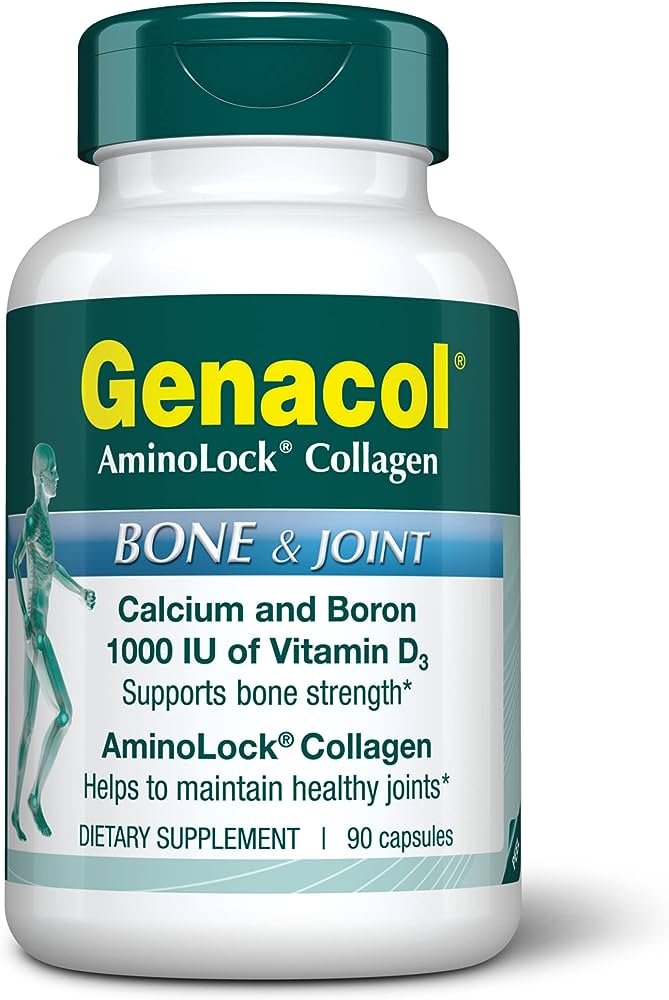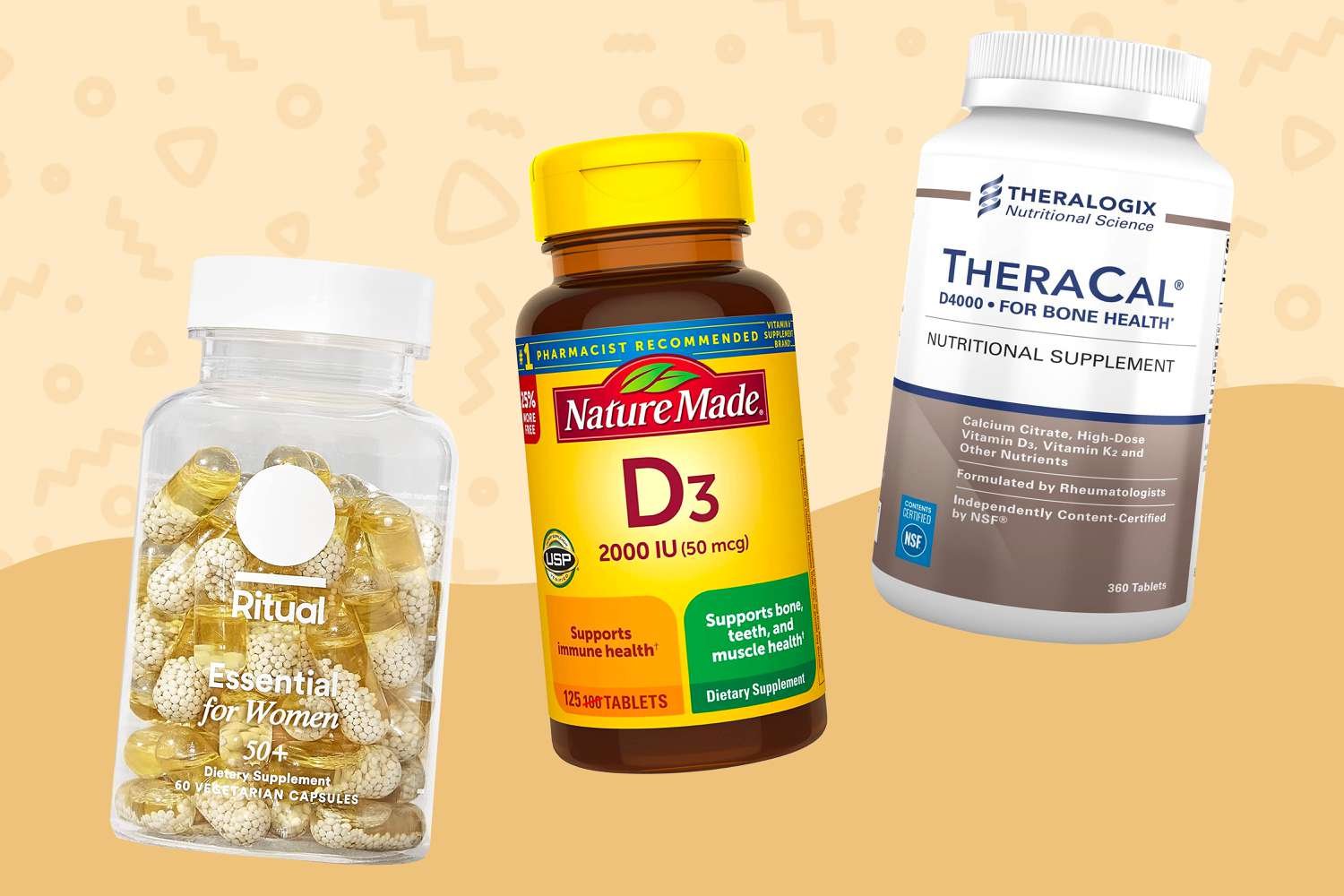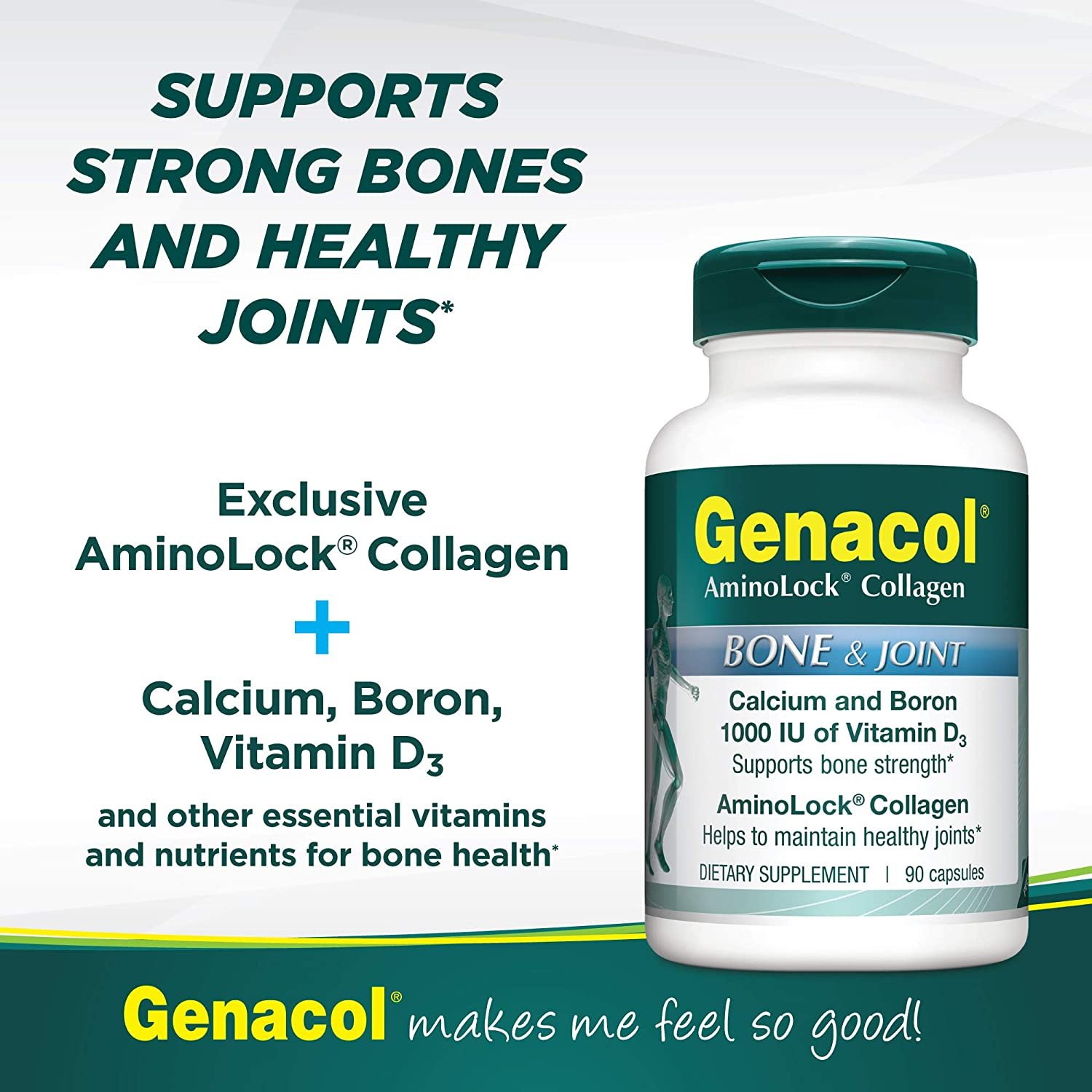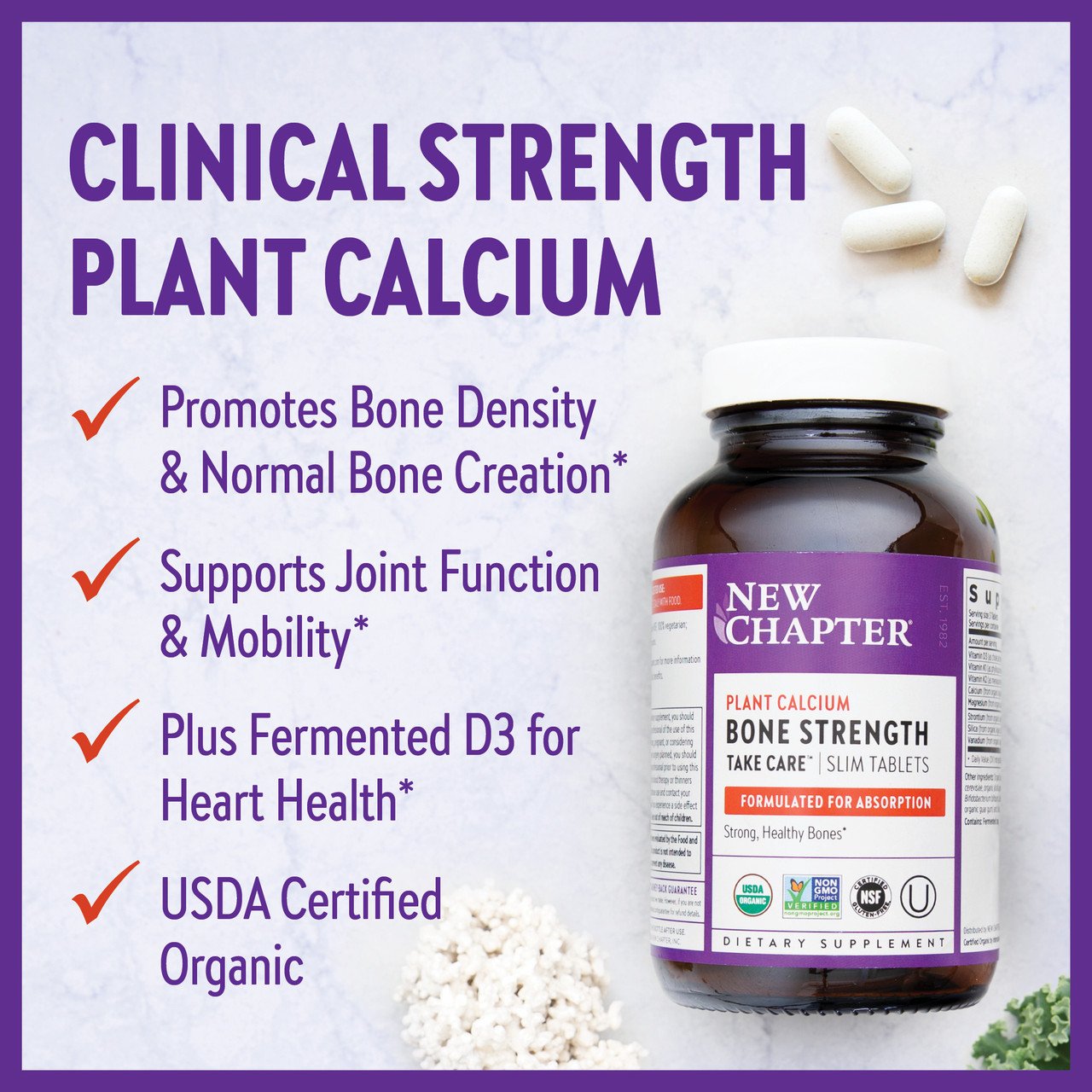In this article, you will discover the crucial vitamins that play a vital role in maintaining strong and healthy bones and joints. We all know the importance of a balanced diet, but did you know that certain vitamins can specifically target the health of your skeletal system? From promoting bone density to reducing inflammation, these essential vitamins can help keep your bones and joints functioning optimally, allowing you to enjoy an active and pain-free lifestyle. So, let’s dive into this essential guide to discover the vitamins that can contribute to stronger bones and joints.

This image is property of Amazon.com.
Vitamin D
Role in bone health
Vitamin D plays a significant role in maintaining bone health. It helps in the absorption of calcium and phosphorus from the intestine, which are necessary for strong and healthy bones. Vitamin D also helps in regulating the levels of calcium and phosphorus in the blood, preventing them from being leached from the bones. In addition, this essential vitamin promotes the production of osteocalcin, a protein that assists in the mineralization of bone tissue.
Sources of vitamin D
The most natural source of vitamin D is sunlight. When your skin is exposed to sunlight, it synthesizes vitamin D. However, due to various factors such as living in northern latitudes, spending limited time outdoors, having darker skin, or using sunscreen, it can be challenging to obtain enough vitamin D from sunlight alone. Therefore, it is essential to include dietary sources of vitamin D in your daily routine. Foods such as fatty fish (salmon, mackerel, and sardines), cod liver oil, fortified dairy products, fortified cereals, and egg yolks are good sources of vitamin D.
Recommended daily intake
The recommended daily intake of vitamin D varies based on age and health conditions. For most adults, it is recommended to consume around 600-800 international units (IU) of vitamin D per day. However, certain groups, such as older adults, pregnant and breastfeeding women, as well as individuals with limited sun exposure, may require higher doses. It is always best to consult with a healthcare professional to determine the appropriate daily intake of vitamin D for your specific needs.
Vitamin D deficiency and bone health
Vitamin D deficiency can significantly impact bone health. Insufficient levels of vitamin D can lead to a decreased absorption of calcium, resulting in low mineral density and weakened bones. In children, a severe deficiency can cause rickets, which is characterized by the softening and weakening of the bones. In adults, a deficiency may lead to osteomalacia, a condition where the bones become fragile and prone to fractures. Therefore, ensuring an adequate intake of vitamin D is crucial for maintaining strong and healthy bones.
Supplements for vitamin D
If it is challenging to obtain enough vitamin D from sunlight and dietary sources alone, supplements can be used to meet the recommended daily intake. Vitamin D supplements are available in various forms, such as tablets, capsules, and liquid drops. It is important to choose a supplement that contains vitamin D3 (cholecalciferol), as it is more effective in raising blood levels of vitamin D compared to vitamin D2 (ergocalciferol). Before starting any supplements, it is advisable to consult with a healthcare professional to determine the appropriate dosage for your specific needs.
Calcium
Importance of calcium for bones and joints
Calcium is widely known for its crucial role in maintaining strong bones and teeth. About 99% of the calcium in our bodies is stored in our bones and teeth, providing structural support and strength. In addition to bone health, calcium is also essential for proper muscle function, blood clotting, and nerve transmission. Adequate calcium intake is necessary to prevent conditions such as osteoporosis, which can lead to weakened bones and an increased risk of fractures.
Calcium-rich foods
Including calcium-rich foods in your diet is essential to meet your daily calcium requirements. Dairy products such as milk, cheese, and yogurt are excellent sources of calcium. If you are lactose intolerant or follow a vegan diet, there are plenty of non-dairy sources of calcium available as well. Some examples include fortified plant-based milk, tofu, almonds, sesame seeds, leafy greens (kale, spinach, and collard greens), and canned fish with edible bones (such as sardines and salmon).
Recommended daily intake of calcium
The recommended daily intake of calcium depends on age and gender. For most adults, it is recommended to consume around 1000 milligrams (mg) of calcium per day. Adolescents, pregnant and breastfeeding women, as well as postmenopausal women, may require higher doses. However, consuming more than the recommended intake is not advised, as excessive calcium intake can lead to kidney stones and other health complications. It is important to maintain a balanced approach to calcium consumption and consult with a healthcare professional to determine the appropriate daily intake for your specific needs.
Calcium absorption and vitamin D
Vitamin D is essential for the absorption and utilization of calcium in the body. Without adequate levels of vitamin D, the body cannot effectively absorb calcium from the intestine, leading to a calcium deficiency and weakened bones. Therefore, it is important to ensure sufficient vitamin D levels when aiming for optimal calcium absorption. By maintaining adequate levels of both vitamin D and calcium, you can support overall bone health and prevent the risk of conditions such as osteoporosis.
Supplements for calcium
If it is challenging to meet your daily calcium requirements through dietary sources alone, calcium supplements can be considered. Calcium supplements are available in various forms, including tablets, capsules, and chewable tablets. It is important to choose a supplement that contains a form of calcium that is easy for your body to absorb, such as calcium carbonate or calcium citrate. It is recommended to divide the calcium intake into smaller doses throughout the day, as the body can only absorb a limited amount of calcium at once. Consulting with a healthcare professional before starting any calcium supplements is advisable to determine the appropriate dosage for your specific needs.

This image is property of Amazon.com.
Vitamin K
Role in bone health and joint function
Vitamin K plays a vital role in facilitating bone health and joint function. It is involved in the production of proteins that regulate the mineralization of bone tissue, thereby increasing bone strength and reducing the risk of fractures. Additionally, vitamin K is crucial for maintaining proper cartilage and joint health, helping to prevent conditions such as osteoarthritis.
Sources of vitamin K
There are two main forms of vitamin K: vitamin K1 (phylloquinone) and vitamin K2 (menaquinone). Vitamin K1 is found in green leafy vegetables such as kale, spinach, and broccoli, as well as in vegetable oils. Vitamin K2, however, is primarily sourced from fermented foods such as natto (fermented soybeans), cheese, and certain animal products like liver and eggs.
Recommended daily intake
The recommended daily intake of vitamin K varies based on age and gender. For adult men, it is recommended to consume around 120 micrograms (mcg) per day, while adult women should aim for approximately 90 mcg per day. Adequate vitamin K intake is important to maintain optimal bone health and support joint function.
Vitamin K deficiency and bone health
A deficiency of vitamin K can have a negative impact on bone health. Without enough vitamin K, the body’s ability to produce the proteins necessary for bone mineralization is compromised, resulting in reduced bone strength and increased susceptibility to fractures. Adequate intake of vitamin K through diet or supplementation is crucial to prevent deficiencies and maintain strong bones.
Supplements for vitamin K
While it is generally recommended to obtain vitamins through a balanced diet, vitamin K supplements can be considered if you have difficulty meeting the recommended daily intake. Vitamin K supplements are available in various forms, such as tablets and capsules. However, it is important to note that excessive intake of vitamin K through supplementation may interfere with certain medications, such as blood thinners. Therefore, it is advisable to consult with a healthcare professional to determine the appropriate dosage and ensure compatibility with any medications you may be taking.
Magnesium
Importance of magnesium for bone density and joint health
Magnesium plays a crucial role in maintaining bone density and supporting joint health. It is involved in the activation of vitamin D, which aids in the absorption and utilization of calcium for bone formation. Magnesium also plays a role in regulating calcium balance within the body, ensuring that calcium is properly utilized and deposited in the bones. Additionally, magnesium is important for maintaining the integrity of cartilage and connective tissues in the joints.
Magnesium-rich foods
Including magnesium-rich foods in your diet can help meet your daily requirements. Good sources of magnesium include green leafy vegetables (spinach, kale), nuts and seeds, legumes, whole grains, seafood, and dark chocolate. By incorporating these foods into your meals and snacks, you can ensure adequate magnesium intake for optimal bone density and joint health.
Recommended daily intake of magnesium
The recommended daily intake of magnesium varies based on age and gender. For most adults, the recommended intake is around 400-420 milligrams (mg) for men and 310-320 mg for women. However, individual requirements may vary depending on factors such as pregnancy, breastfeeding, and certain medical conditions. Consulting with a healthcare professional can help determine the appropriate daily intake of magnesium for your specific needs.
Magnesium absorption and vitamin D
Vitamin D is necessary for optimal magnesium absorption and utilization in the body. Adequate levels of vitamin D help promote the absorption of magnesium from the intestine and its transportation to the bones and muscles. Therefore, maintaining sufficient vitamin D levels is crucial for maximizing the benefits of magnesium for bone density and joint health.
Supplements for magnesium
If it is challenging to obtain enough magnesium through dietary sources alone, supplements can be considered. Magnesium supplements are available in various forms, including tablets, capsules, and powders. It is advisable to choose a supplement that contains a bioavailable form of magnesium, such as magnesium citrate or magnesium glycinate. However, it is important to consult with a healthcare professional before starting any magnesium supplements, as excessive magnesium intake can cause digestive issues in some individuals.

This image is property of www.verywellfit.com.
Vitamin C
Role in collagen synthesis
Vitamin C plays a vital role in the synthesis of collagen, a primary component of bone and connective tissues. Collagen provides structural support to bones, tendons, ligaments, and cartilage. Without adequate vitamin C, the production and maintenance of collagen are compromised, leading to impaired bone health and joint function.
Sources of vitamin C
Vitamin C can be obtained from various dietary sources. Citrus fruits such as oranges, grapefruits, and lemons are well-known for their high vitamin C content. Other fruits like strawberries, kiwi, and papaya are also excellent sources. Vegetables such as bell peppers, broccoli, and Brussels sprouts, as well as leafy greens like kale and spinach, are abundant in vitamin C.
Recommended daily intake
The recommended daily intake of vitamin C varies based on age and gender. For adult men, it is recommended to consume around 90 milligrams (mg) per day, while adult women should aim for approximately 75 mg per day. However, certain groups, such as smokers and pregnant or breastfeeding women, may require higher doses. Adequate vitamin C intake is essential to support collagen synthesis and maintain healthy bones and joints.
Vitamin C deficiency and bone health
A deficiency of vitamin C can have detrimental effects on bone health. Without sufficient vitamin C, collagen production may be compromised, leading to weakened bones and an increased risk of fractures. In severe cases, a deficiency in vitamin C can result in scurvy, a condition characterized by weakness, joint pain, and bone abnormalities. Ensuring an adequate intake of vitamin C through diet or supplementation is essential to prevent deficiencies and maintain optimal bone health.
Supplements for vitamin C
Vitamin C supplements can be used to meet the recommended daily intake if necessary. Supplements are available in various forms, including tablets, capsules, and powders. It is important to choose a supplement that provides a sufficient dosage of vitamin C without exceeding the recommended daily intake. As with any supplement, it is advisable to consult with a healthcare professional before starting vitamin C supplementation to determine the appropriate dosage for your specific needs.
Vitamin A
Importance of vitamin A for bone growth and development
Vitamin A is crucial for bone growth, development, and maintenance. It plays a significant role in the formation and remodeling of bone tissue. By stimulating the production of osteoblasts (cells responsible for bone formation) and regulating the activity of osteoclasts (cells involved in bone resorption), vitamin A helps maintain bone integrity and strength.
Vitamin A-rich foods
There are two forms of vitamin A: preformed vitamin A and provitamin A carotenoids. Preformed vitamin A is found in animal-based foods such as liver, fish oil, dairy products, and eggs. Provitamin A carotenoids, which can be converted into vitamin A in the body, are abundant in fruits and vegetables such as carrots, sweet potatoes, leafy greens, squash, and bell peppers.
Recommended daily intake of vitamin A
The recommended daily intake of vitamin A varies based on age and gender. For adult men, it is recommended to consume around 900 micrograms (mcg) of retinol activity equivalents (RAE) per day, while adult women should aim for approximately 700 mcg RAE per day. It is important to note that excessive intake of vitamin A through supplements can be toxic, so it is advisable to consult with a healthcare professional to determine the appropriate dosage for your specific needs.
Vitamin A deficiency and bone health
A deficiency of vitamin A can have detrimental effects on bone health. Insufficient levels of vitamin A can impair bone development and growth, leading to weakened bones and an increased risk of fractures. Adequate intake of vitamin A through diet or supplementation is essential to prevent deficiencies and maintain optimal bone health.
Supplements for vitamin A
If it is challenging to meet your daily vitamin A requirements through dietary sources alone, supplements can be considered. However, it is important to note that excessive intake of vitamin A can be toxic. Therefore, it is always advisable to consult with a healthcare professional before starting any vitamin A supplements to determine the appropriate dosage and ensure compatibility with any medications you may be taking.

This image is property of i5.walmartimages.com.
Vitamin B6
Role in collagen production and joint health
Vitamin B6 plays a crucial role in collagen production, which is essential for maintaining the health and integrity of joints. Collagen provides structural support to joints, tendons, ligaments, and cartilage. Without adequate vitamin B6, the production of collagen may be compromised, leading to joint stiffness, pain, and reduced flexibility.
Sources of vitamin B6
Vitamin B6 is present in a variety of foods. Good sources include poultry, fish, lean meats, whole grains, nuts, seeds, potatoes, bananas, and legumes. By incorporating these foods into your diet, you can ensure adequate intake of vitamin B6 for collagen production and overall joint health.
Recommended daily intake
The recommended daily intake of vitamin B6 varies based on age and gender. For most adults, it is recommended to consume around 1.3-1.7 milligrams (mg) per day. However, pregnant and breastfeeding women have higher requirements, with recommended intake ranging from 1.9-2.0 mg per day. Adequate vitamin B6 intake is important to support collagen production and maintain healthy joints.
Vitamin B6 deficiency and bone health
A deficiency of vitamin B6 can have negative effects on bone health and joint function. Insufficient levels of vitamin B6 may lead to reduced collagen production, impairing the structural integrity of bones and joints. This can contribute to conditions such as osteoporosis and joint disorders. Ensuring an adequate intake of vitamin B6 through diet or supplementation is crucial to prevent deficiencies and maintain optimal bone and joint health.
Supplements for vitamin B6
Vitamin B6 supplements can be considered if it is challenging to meet the recommended daily intake through dietary sources alone. Supplements are available in various forms, including tablets and capsules. However, it is always advisable to consult with a healthcare professional before starting any vitamin B6 supplements to determine the appropriate dosage for your specific needs.
Vitamin B12
Impact on bone mineral density
Vitamin B12 plays a role in maintaining bone mineral density. It contributes to the formation and maintenance of bone tissue, helping to prevent conditions such as osteoporosis. Adequate levels of vitamin B12 are essential for the absorption and utilization of calcium and other minerals necessary for bone health.
Sources of vitamin B12
Vitamin B12 is naturally found only in animal-based foods. Good sources include meat, fish, poultry, dairy products, and eggs. Some fortified plant-based foods such as breakfast cereals, plant-based milk, and nutritional yeast can also provide vitamin B12 for individuals following a vegan or vegetarian diet.
Recommended daily intake
The recommended daily intake of vitamin B12 varies based on age and gender. For most adults, it is recommended to consume around 2.4 micrograms (mcg) per day. However, certain groups, such as older adults and individuals with gastrointestinal disorders or malabsorption issues, may require higher doses. Adequate vitamin B12 intake is important to support bone mineral density and overall bone health.
Vitamin B12 deficiency and bone health
A deficiency of vitamin B12 can have adverse effects on bone health. Insufficient levels of vitamin B12 can impair the body’s ability to absorb calcium and other minerals necessary for bone formation, leading to reduced bone mineral density and an increased risk of fractures. It is crucial to ensure adequate vitamin B12 intake through diet or supplementation to prevent deficiencies and maintain optimal bone health.
Supplements for vitamin B12
If it is challenging to meet your daily vitamin B12 requirements through dietary sources alone, supplements can be considered. Vitamin B12 supplements are available in various forms, including tablets, capsules, and sublingual (under the tongue) formulations. It is advisable to choose a supplement that contains methylcobalamin or cyanocobalamin, which are the preferred forms of vitamin B12. It is always recommended to consult with a healthcare professional before starting any vitamin B12 supplements to determine the appropriate dosage for your specific needs.

This image is property of cdn11.bigcommerce.com.
Vitamin E
Role in reducing inflammation in joints
Vitamin E, a powerful antioxidant, plays a role in reducing inflammation and oxidative stress in the joints. Chronic inflammation can contribute to the breakdown of joint tissues and the development of conditions such as osteoarthritis. By neutralizing harmful free radicals, vitamin E helps protect joint tissues and maintain their function.
Sources of vitamin E
Vitamin E can be found in various foods. Good sources include nuts and seeds (such as almonds, sunflower seeds, and peanuts), vegetable oils (such as sunflower oil and olive oil), spinach, broccoli, and fortified cereals. By incorporating these foods into your diet, you can ensure adequate intake of vitamin E to support joint health.
Recommended daily intake
The recommended daily intake of vitamin E varies based on age and gender. For most adults, it is recommended to consume around 15 milligrams (mg) per day. Adequate vitamin E intake is important to support joint health and reduce inflammation.
Vitamin E deficiency and bone health
A deficiency of vitamin E can impact joint health and increase the risk of inflammation-related joint disorders. Insufficient levels of vitamin E can lead to increased oxidative stress in the joints, contributing to tissue damage and inflammation. It is crucial to ensure adequate vitamin E intake through diet or supplementation to prevent deficiencies and maintain optimal joint health.
Supplements for vitamin E
If it is challenging to meet your daily vitamin E requirements through dietary sources alone, supplements can be considered. Vitamin E supplements are available in various forms, including capsules and softgels. It is advisable to choose a supplement that contains natural vitamin E (d-alpha-tocopherol) rather than synthetic forms. As with any supplement, it is recommended to consult with a healthcare professional before starting vitamin E supplementation to determine the appropriate dosage for your specific needs.
Omega-3 Fatty Acids
Benefits for bone and joint health
Omega-3 fatty acids, particularly EPA (eicosapentaenoic acid) and DHA (docosahexaenoic acid), have been shown to have various benefits for bone and joint health. These essential fatty acids help reduce inflammation in the joints, relieving symptoms of conditions such as rheumatoid arthritis. Omega-3 fatty acids also promote optimal bone remodeling and density, contributing to overall bone health.
Sources of omega-3 fatty acids
The primary dietary sources of omega-3 fatty acids are fatty fish, such as salmon, mackerel, and sardines. Plant-based sources include flaxseeds, chia seeds, hemp seeds, and walnuts. Although plant-based sources provide alpha-linolenic acid (ALA), the body needs to convert ALA into EPA and DHA, which is not very efficient. Therefore, consuming fatty fish or considering fish oil supplements can ensure an adequate intake of EPA and DHA.
Recommended daily intake
The recommended daily intake of omega-3 fatty acids varies based on age and gender. For most adults, it is recommended to consume around 250-500 milligrams (mg) of combined EPA and DHA per day. However, certain groups, such as individuals with inflammatory joint conditions, may require higher doses. Adequate omega-3 fatty acid intake is important to support joint health and maintain optimal bone density.
Omega-3 deficiency and bone health
A deficiency of omega-3 fatty acids can have negative effects on bone health and joint function. Insufficient levels of omega-3 fatty acids can contribute to increased inflammation in the joints and a higher risk of developing conditions such as rheumatoid arthritis. Omega-3 deficiency may also impact bone density and contribute to conditions such as osteoporosis. Ensuring an adequate intake of omega-3 fatty acids through diet or supplementation is crucial to prevent deficiencies and maintain optimal bone and joint health.
Supplements for omega-3 fatty acids
If it is challenging to obtain enough omega-3 fatty acids through dietary sources alone, supplements can be considered. Fish oil supplements are the most common and readily available source of omega-3 fatty acids. These supplements contain concentrated amounts of EPA and DHA. It is advisable to choose a reputable brand that undergoes third-party testing to ensure purity and quality. As with any supplement, it is recommended to consult with a healthcare professional before starting omega-3 fatty acid supplementation to determine the appropriate dosage for your specific needs.
In conclusion, ensuring an adequate intake of essential vitamins and minerals is crucial for maintaining strong bones and joints. Vitamin D, calcium, vitamin K, magnesium, vitamin C, vitamin A, vitamin B6, vitamin B12, vitamin E, and omega-3 fatty acids all play significant roles in supporting bone health, joint function, and overall musculoskeletal well-being. By incorporating a balanced diet that includes a variety of nutrient-rich foods or considering supplements when necessary, you can promote optimal bone density, reduce the risk of fractures, support joint health, and enhance your overall quality of life. Remember to consult with a healthcare professional before making any significant changes to your diet or starting any supplementation regimen to ensure personalized recommendations based on your specific health needs.